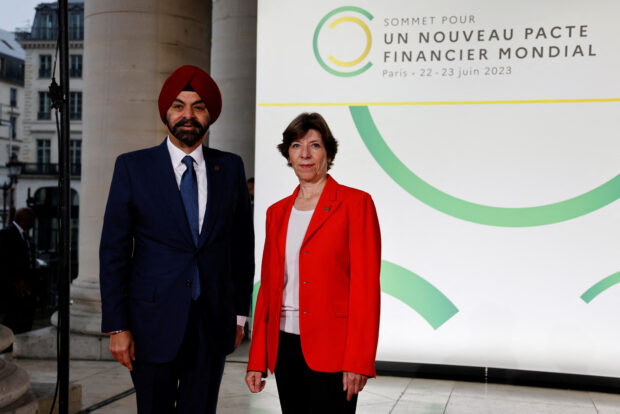
U.S. Treasury Secretary Janet Yellen and French Finance Minister Bruno Le Maire met at the New Global Financing Pact in Paris, France on June 22, 2023. During the summit, the World Bank announced that it will provide easier financing options for countries affected by natural disasters. At the same time, the International Monetary Fund (IMF) achieved its goal of making $100 billion in special drawing rights available for vulnerable nations.
The gathering, attended by about 40 leaders including representatives from Africa, China, and Brazil, aims to stimulate a new global finance agenda. The agenda focuses on enhancing crisis financing for low-income countries, alleviating their debt burdens, reforming post-war financial systems, and allocating funds to combat climate change. The goal is to gain high-level consensus on various initiatives that are struggling within organizations like the G20, COP, IMF-World Bank, and United Nations.
Later in the summit, an announcement regarding Zambia’s debt was expected. Creditors had recently indicated that a restructuring proposal was almost finalized after more than two years of negotiations. United Nations Secretary General Antonio Guterres highlighted the failure of the current international financial architecture to provide adequate support to developing nations, labeling the system as outdated, dysfunctional, and unfair.
Leaders at the summit plan to advocate for multilateral development banks, such as the World Bank, to take on more financial risk to increase lending. This proposal is outlined in a draft summit statement obtained by Reuters. During a panel discussion, World Bank President Ajay Banga shared a “toolkit” that includes options like debt repayment pauses, flexibility to redirect funds for emergencies, new types of insurance for development projects, and assistance in building advanced emergency systems.
Ethiopian Prime Minister Abiy Ahmed stressed the need for a robust and predictable financial safety net, calling for increased below-market financing and more grants for African countries that are facing financial constraints. While the new measures from the World Bank aim to provide relief for developing nations, there was no discussion about debt writedowns. China, the largest bilateral creditor in the world, has urged institutions like the World Bank and IMF to absorb some of the losses, a proposal that is opposed by these institutions and wealthy countries.
Leaders at the summit voiced the need for a new vision for the World Bank and other multilateral financial institutions, given the ongoing conflicts, climate crisis, widening wealth gaps, and declining progress. French President Emmanuel Macron, as the host of the summit, emphasized the importance of taking action to prevent a loss of trust.
The summit seeks to establish roadmaps for the next 18-24 months, focusing on areas such as debt relief and climate finance. Many of these topics are inspired by the “Bridgetown Initiative,” a group of developing countries led by Barbados Prime Minister Mia Mottley.
The coronavirus pandemic has worsened the debt distress of many poor countries, forcing them to continue meeting their obligations despite the significant impact on their finances. Additionally, African countries face the dual challenge of climate change impacts and transitioning to green energy. Wealthy nations have yet to fulfill their climate finance commitment of mobilizing $100 billion annually, posing a major obstacle in global climate talks.
Nearly eighty years after the establishment of the World Bank and IMF through the Bretton Woods Agreement, leaders aim to secure additional financing from multilateral lenders for countries in need. The IMF announced that it has made $100 billion in special drawing rights available for vulnerable nations. In 2021, rich countries agreed to redirect unused IMF special drawing rights to poor countries.
U.S. Treasury Secretary Janet Yellen, representing the World Bank’s largest shareholder, stated that multilateral development institutions should improve their effectiveness in utilizing funds before considering additional capital contributions. The summit also emphasizes the importance of increased involvement from the private sector.
As part of a partnership called the Just Energy Transition Partnership (JETP), a coalition of countries has pledged 2.5 billion euros ($2.7 billion) to Senegal to support its goal of generating 40% of its energy capacity from renewable sources by 2030. This marks the fourth JETP agreement, following similar deals with Indonesia, Vietnam, and South Africa since 2021.
In conclusion, the New Global Financing Pact summit in Paris aims to address various financial and climate challenges faced by developing countries. Efforts include providing easier financing options, debt relief, and reforming financial systems. Leaders advocate for increased involvement from multilateral development banks, the private sector, and fulfilling climate finance commitments. The summit seeks to create comprehensive roadmaps for the next couple of years, focusing on areas like debt relief and climate finance.
Denial of responsibility! SamacharCentrl is an automatic aggregator of Global media. In each content, the hyperlink to the primary source is specified. All trademarks belong to their rightful owners, and all materials to their authors. For any complaint, please reach us at – [email protected]. We will take necessary action within 24 hours.

Omprakash Tiwary is a business writer who delves into the intricacies of the corporate world. With a focus on finance and economic landscape. He offers readers valuable insights into market trends, entrepreneurship, and economic developments.

